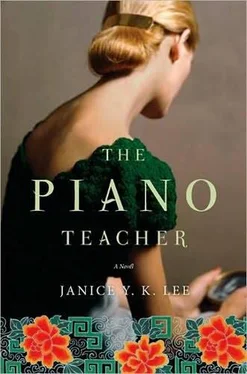“Realistically, they’re going to keep us all in a group. So I assume there will be some sort of collective living for a while, as they figure out what they’re going to do with us. I’ve heard of mass exchanges between governments, so they might exchange us for Japanese who are living in our countries. But it might take a rather long time to get all that sorted out, so we should really have a plan of how to keep in contact.”
After lunch, Will and Trudy go upstairs to pack a suitcase.
“What will you need? A toothbrush.” She hands him a new one. “Tooth powder. Surely those are necessities. A comb-can’t have you looking disheveled. On the other hand, perhaps we don’t want you looking too handsome and getting yourself and all the ladies in trouble.”
“Will you come with me?” he says. This is what he has wanted to ask all morning. The thought of leaving her makes him short of breath. He has seen her every day for months, not gone more than a few hours without smelling her skin, her hair. He finds other women grotesque now-they are too large, too loud, too slow. One afternoon, a short while after he had first arrived in Hong Kong, he and Simonds had sat at their desks and watched, mesmerized, as one is by the mundane, as their office lady, Miss Tsai, boiled water and poured it into a thermos. Miss Tsai was thin and wore metal spectacles. Her shoulders, which she covered with the same gray cardigan every day, were so small they looked as brittle as a bird’s bones. Her hair was cropped short and often shined with grease. Simonds had turned to him-this was before Trudy-and said, “I don’t understand how some find Chinese women attractive. They have no sex, so spindly.” Will wishes Simonds had met Trudy, the languorous slip of her. He had shipped out a little after the time Will had first met Trudy at the party, still professing his desire to find a buxom young Englishwoman with whom to form a family. He’s probably found her by now. But Will suspects he would find his English lass too rosy, too exuberant, next to the rapier-sharp silhouette that is Trudy.
She stops at his question, but only for a moment, then continues packing. “Why on earth would I cage myself up if I had a choice?”
“You don’t know what it’s going to be like out here,” he says. “At least in there, you’ll get three squares a day and a bed.” He cannot bring himself to simply ask her to come to be with him. Instead he sells it like some low-cost holiday.
Finished with his package, she begins to pack some of her own clothes in a suitcase.
“I’d rather take my chances out here,” she says. “You don’t know what it’s going to be like in the camps. The Japs can be brutal. And it will be good for you to have someone on the outside. I’ll come and give you packages and news of the outside. The Lusitano Club is taking all Portuguese, half-breeds like me too, and they have decent sleeping quarters. If things get bad, I’ll just go there. And Dommie will take care of me.”
“We could marry,” he says. “I’ll take care of you better.”
She looks up. He is frightened of her face, willfully blank.
“You don’t know what will happen out here,” he repeats. “At least we will be together.”
She goes on folding her sweaters. Her hands are quick and sure.
“Do you know what the Chinese think of the English?” she says a moment later, as if he hadn’t said anything of importance.
“Not really, but I hope Dominick isn’t representative.”
Trudy laughs.
“Well, a bit, although there’s more to that situation than meets the eye. Don’t be too harsh about him. He has his reasons. But many Chinese think English are rude and arrogant and think so much of their own heritage when ours is so much older and richer. And they’re terribly stingy. I’ve never seen an Englishman pick up the bill for dinner, when even the poorest Chinese would be ashamed to let someone else pay if it were his invitation. It’s odd, don’t you think? I like our way so much better. We Chinese are not stupid. We know that most of the Englishmen here live in a way they could never afford in their own country, and they’re living here like kings because their money happens to buy a lot more of our labor than our own money does. So they think they’re the lords here and we’re the serfs. But it doesn’t change the fact that back at home they could never have the lavish life they have here. They’re living on borrowed money, under assumed identities. You’re not very English, Will. You’re generous to a fault and very gracious and humble. I’m so glad you’re not like most of your countrymen.”
“I say,” he says. “I don’t know if this is the thing we should be talking about. I mean, this is quite a moment, right?”
“I know, I know,” she says impatiently, as if he’s missing the point. “I just meant that a lot of the locals don’t really care what happens to the British. But at the same time, they don’t really care about the Japanese either. Everyone just wants to live their lives, undisturbed, make a little money, make a little love, die with some food in their stomach. That’s all.”
Trudy’s points always take a while to sink in because they’re unexpected, as if spoken from the mouth of a child, and then Will always realizes how very shrewd she is. And how practical. He watches her pack an evening dress and, after a moment’s hesitation, a matching shawl.
“Have you seen my silver evening shoes?” she asks.
“Never knew you had any,” he says. He doesn’t ask why she might think she would need evening clothes in a time of war.
“I always look forward,” Trudy says suddenly. “Never backward. I hate photographs, diaries, clippings. What’s the point? I don’t understand how people can keep diaries-horrid things.” He is surprised at her vehemence.
“I’ve always kept a journal of my travels.”
“That’s different, more of a travelogue, I would think.”
“Well, my impressions, certainly. And the people I meet.”
“I certainly hope I am not in this journal of yours.”
“You would be disappointed,” he says after a pause.
“People can be so loathsome, don’t you think?” she says. “If we aren’t together in the future, please don’t think of me with hatred. Think of me kindly or forget me. I always try to do that. Think with kindness and don’t judge. And know the entire situation.”
“What on earth are you saying? Don’t take such absurd leaps.” He feels like she’s punched him in the stomach, cannot feign the nonchalance, but cannot say too, don’t leave me.
“If you love me, you know exactly who I am.”
“Trudy, you are not this person. You are not.”
“And you are not stupid, my love.” She hands him his bag. “There. All set for your grand adventure.”
At the parade ground, he notes with chagrin that others seem to have brought all of their belongings, stuffed into enormous suitcases that are filled to bursting and tied shut with heavy twine. Some practical joker has brought his golf clubs. There are people sitting on their luggage, drinking from thermoses, looking lost. There are also, curiously, Chinese people with all their belongings tied up in pink and red cloths, slung over their shoulders, squatting in the shade.
Will has money tucked into his trousers, and a few gold rings and bracelets Trudy has forced on him. “Gold is good; people will always take gold,” her voice rings in his ears. He has only his small satchel, with the few essential items she had packed. Ned has some of Frederick ’s clothes Angeline gave him, ill-fitting as they are-the young Canadian bringing out the maternal side of both the women.
Trudy had stopped just long enough for them to get out of the car and to give him a light kiss, and then she had spun away quickly. A good-bye made of nothing. He stands there for a moment, Ned shuffling awkwardly near him, then picks up his bag, feeling slightly embarrassed that the young man has seen their bloodless good-bye. He spots the Trotters, the Arbogasts. He goes over to Hugh Trotter and introduces him to Ned, explaining his situation.
Читать дальше












